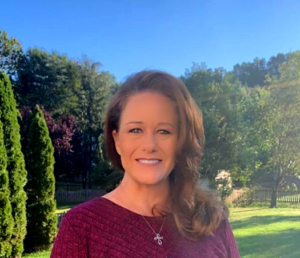 Christy DeWitt has an impressive amount of experience as a military spouse. She and her husband, Kevin, celebrated their 30th anniversary in July of last year, and Kevin retired from active-duty service in 2020. Given all that time spent with the United States Marine Corps, Christy sounds almost embarrassed when she admits that in her family “only” moved nine times. “We might not have moved as much as many military families, but I’ve loved every place we’ve ever lived,” she says.
Christy DeWitt has an impressive amount of experience as a military spouse. She and her husband, Kevin, celebrated their 30th anniversary in July of last year, and Kevin retired from active-duty service in 2020. Given all that time spent with the United States Marine Corps, Christy sounds almost embarrassed when she admits that in her family “only” moved nine times. “We might not have moved as much as many military families, but I’ve loved every place we’ve ever lived,” she says.
A pastor’s daughter, Christy met Kevin at church where her dad was Kevin’s pastor. “I actually tried to set Kevin up with my little sister,” she confesses, but things worked out for the best. Having spent her childhood in Texas as a preacher’s child, Christy readily admits that she had no idea what she was signing on for when she married her Marine. “I knew nothing! Before becoming a military spouse, though, I did all the research I could. I tried to get the jargon down. As a new spouse, if there was a seminar, class, or anything available where I could learn, I took it,” she says. Christy credits her time as a military spouse for teaching her so many things, but mainly how much she’s capable of doing on her own. “I really had a chance to build my confidence, my self-advocacy,” she says. “Through deployments, TDYs, etc., I learned we’re more resilient than we give ourselves credit for.”

That resiliency has stood her well as she raised three children while Kevin was active duty, endured two deployments over a year, and co-founded the military-centric jewelry company Nomadés 14 years ago with other like-minded military spouses. “Things have come so far for military spouses in the last 23 years,” Christy reflects. “I was a stay-at-home mom. I always volunteered. I even tried to go back to college twice. All those experiences I had because I was a military spouse are what gave me the experience and the confidence I needed for Nomadés. I am excited for today’s military spouse, for the options they have through companies like Powerhouse and organizations like Blue Star Families. We have a long way to go, but these changes are so positive.”
Christy can’t remember a duty station she hasn’t loved. “I know all these people who talk about how they didn’t like this place or that place, but for me it was always a chance to live a new experience. For me, I looked first for a church family. Once I found that, everything else would fall into place. I could look for what I could do and where I could make a difference,” she says. Still, for the sheer experience alone, Christy names Okinawa as her favorite duty station. “I was far enough into my military life that it didn’t feel new. I didn’t feel like I was still learning how to be a military spouse, so I could enjoy it,” she says. “We made great friends and got to travel to places like China, Guam, mainland Japan, and Hawaii. And it’s where we were when 9/11 happened.” While the tragedy was certainly difficult for everyone, when Christy reflects on that time, the togetherness and sense of purpose she felt from everyone provided a bond of support and love.
We all know that military life can be hard. “There are times when your spouse’s job comes first,” Christy says. “You don’t have to like it, but I encourage military spouses to be supportive, even if it’s irritating. Go to the coffee shop and rail, alone or to friends, but support your spouse. Complaining won’t change it.” And she offers some old-school advice for deployments: Write your spouse handwritten letters. “Kevin and I have every letter we’ve ever written to each other through deployments,” she says. “My father-in-law passed two years ago, and my mother-in-law had all the letters they’d written to each other when he was deployed. It was so special to Kevin to be able to read those parts where his dad was asking about his little boy and talking about how much he missed him. They’re tangible memories in a way texts and emails just aren’t.”
She also encourages military spouses to keep family contacts strong. “As often as I could, I tried to be with grandparents, whether they visited us or we visited them. It helps that our parents are friends and more often than not our families do things together. Our kids don’t even really realize that their cousins from my side of the family aren’t cousins with Kevin’s side of the family!” she says. Traditions, especially holidays, might look different from year to year for military families, but family remains an important connection that is worth nurturing.
Go to the classes, Christy suggests. Go to seminars, to anything where people come together where you are, especially if they’re events where local resources show you what your home-for-now place has to offer. “The military is doing a lot better at having local resources available,” she says. Making connections like these are what led Christy to some of her best friends and people she’s kept in contact with, even before social media sites like Facebook were available.
Christy’s military spouse motto? “We didn’t, in fact, know what we signed up for!” she says with a laugh, referring to an idea that military spouses know what they’re getting into when they marry a military member. “I had no clue what I was signing up for all those years ago,” she says, but she wouldn’t trade the experience for the world.
Did you enjoy this article? Read the full e-magazine, here.


